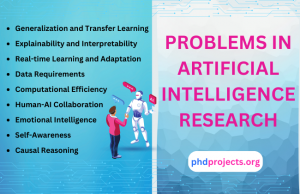PROBLEMS IN ARTIFICIAL INTELLIGENCE RESEARCH
What are the biggest challenges in the field of artificial intelligence and cognitive sciences?
Here we have classified the biggest challenges in the field of artificial intelligence and cognitive sciences as technical, ethical, and interdisciplinary topics. So, gain a deep understanding of cognitive and artificial intelligence projects by our researchers and develop innovative research ideas with our aid. Conference paper under cognitive and artificial intelligence are well supported by our writers your work stands as a good example throughout your academics.
Technical Challenges:
- Generalization and Transfer Learning: Presently the machine learning models often show specialization and are trained for particular work. The capacity of these models is to generalize across various yet interconnected tasks and as a substantial challenge.
- Explainability and Interpretability: Neural networks are more complex so now a days understanding the reasoning behind their decisions becomes more difficult as they are machine learning models.
- Real-time Learning and Adaptation: Only on offline AI systems are trained so it is not capable of adjusting to new information or changing circumstances.
- Data Requirements: It becomes time-consuming and expensive to collect as current machine learning algorithms require large, labeled datasets.
- Computational Efficiency: Deep neural networks, need important computational resources and stating problems for scalability and energy efficiency.
Ethical Challenges:
- Bias and Fairness: While training data or designers, AI algorithms can get the biases which leads to unfair choices.
- Privacy: When personal or sensitive data are involved user privacy is in an uncertainty.
Interdisciplinary Challenges:
- Human-AI Collaboration: We work how to create an AI system that can supplement human capabilities and work in partnership with people which is considered as a major area of research.
- Cognitive Modeling: Including perceptions from cognitive science to progress AI algorithms to mimic human learning, reasoning, and decision-making processes.
Bridging AI and Cognitive Sciences:
- Consciousness and Self-Awareness: Here we determine if machines have consciousness or self-awareness as a matter that includes both philosophical and technical dimensions.
- Emotional Intelligence: The investigation will be about machines own consciousness or self-awareness which is a matter that involves both philosophical and technical considerations.
- Causal Reasoning: We humans think in terms of cause and effect, common machine learning algorithms are not designed to realize or rationalize causality.
- Human-like Learning: Human learning process is characterized by a extraordinary level of efficiency, as limited number of examples to hold a novel concept. However, Mimicking type of learning in machines stands as a biggest challenge.
So, we tackle all types of challenges under AI and cognitive science across various domain. We use the appropriate tools and languages for its best outcome. Research proposal for your AI projects are well handled by our writers who have more than 15+ years of research experience.

MSC ARTIFICIAL INTELLIGENCE RESEARCH PROJECT TOPICS
Our well-trained scholars come up with latest research topics for your PhD or MS in artificial intelligence. We provide original PhD and MS research work and on time delivery which is our main principle of success in the field of AI.
- Challenges and Opportunities of Edge AI for Next-Generation Implantable BMIs
- Model for Describing Processes of AI Systems Vulnerabilities Collection and Analysis using Big Data Tools
- Visualization and Analysis of Mapping Knowledge Domains for C Studies
- EID: Facilitating Explainable AI Design Discussions in Team-Based Settings
- A study on application of Artificial Intelligence (AI) for cosmetics: Quantum computer is necessary for Beauty-field analysis
- Knowledge Graphs and Enterprise AI: The Promise of an Enabling Technology
- Demonstration of Joint Optimization between Cloud AI and On-board AI in Optical Transport Networks
- Efficient Evaluation of AI Workers for the Human+AI Crowd Task Assignment
- Implementation of AI cloud service to Interactive Projection System
- AI Augmentation for Trustworthy AI: Augmented Robot Teleoperation
- AI Intelligent Control Method for Energy Saving of HVAC Equipment in Smart Parks Based on Deep Learning
- Investigating Bugs in AI-Infused Systems: Analysis and Proposed Taxonomy
- Exploring Pseudo-Analog Video Transmission for Edge-AI Vision Applications
- Identification of Business Goals of AI Service System based on GQM+Strategies
- Creation and Evaluation of a Pretertiary Artificial Intelligence (AI) Curriculum
- Problems of Poison: New Paradigms and “Agreed” Competition in the Era of AI-Enabled Cyber Operations
- The relationships of AI to software engineering
- Applications of AI in Healthcare Sector for Enhancement of Medical Decision Making and Quality of Service
- Setting AI to rights: Intellectual property laws are lagging behind the latest advances in ai tech – but should intelligent systems ‘own’ the inventions they come up with?
- A 22nm 832Kb Hybrid-Domain Floating-Point SRAM In-Memory-Compute Macro with 16.2-70.2TFLOPS/W for High-Accuracy AI-Edge Devices